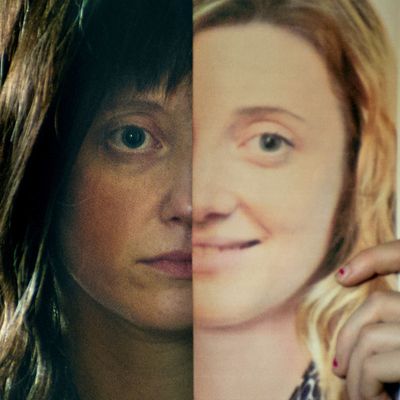
Done right, the first few shots of a film can pack in a load of information, and the two that open Christina Choe’s Nancy lay much of the groundwork for what follows. In the first, Andrea Riseborough’s childlike 35-year-old title character peers into her phone and texts determinedly, the light giving a blue cast to her pale, blotchy face framed by dyed-black hair. The second reveals that Nancy is perched on the edge of a bathtub across from an old woman (Ann Dowd) on the toilet. “If you could get off that for a minute I’d like to get up,” says the woman, who is Nancy’s mother, Betty. It’s bad enough to have to be inches from someone moving her bowels, but to be verbally shat on, too? (“You’re addicted … Would it kill you to comb your hair?”)
It’s no wonder Nancy — living in a dark house caring for a belittling mother — pours all her emotion into creating multiple personae to make connections with other people. No one wants to publish her short stories — she has a glove compartment crammed with rejection letters from magazines. But online she can be someone she thinks other people need. Before going to meet an email correspondent — a man (John Leguizamo) whose wife gave birth to a baby who died after several hours — she straps on a fake belly: She’s now the young blogger who wrote of her decision not to have an abortion. If you didn’t know that Nancy’s pregnancy is a sham, you’d be moved by their conversation. You’re still moved. More important, Nancy is moved.
Nancy is a grim piece of work, but Choe’s empathy for her protagonist gives the film its distinctive texture — woebegone, with flickers of both hope and dread. There’s enough emotional truth in Nancy’s lies to suggest that she wants to believe they’re true. She’s not a psychopath. She’s just very, very damaged. When, after her mother dies, she sees a TV news report about a couple marking the 30th anniversary of their 5-year-old daughter’s disappearance, she wants to believe that she’s that girl, Brooke, and that her supposed mother had kidnapped her from an upstate New York mall. The thing is, she looks a lot like a photo-artist’s rendering of how Brooke would look at 35. The thing is, she might well be Brooke. Which would explain a lot.
Most of Nancy takes place in and around the rambling home in the woods of Ellen (J. Smith-Cameron), a professor, and Leo (Steve Buscemi), a psychologist. Ellen knows at once that Nancy is Brooke and all but throws herself on the younger woman. Leo hangs back, warily, wanting to protect his wife from yet more anguish if the DNA doesn’t match. It doesn’t help their relationship that Nancy arrives with her beloved cat, Paul, and that Leo has a violent cat allergy.
Scene by scene, Nancy is riveting. You don’t want to get your hopes up but you don’t want to watch with your defenses up, either. You don’t want to keep these performances at arm’s length. Riseborough is a true chameleon actress who seems to change color from the inside. As an architect compelled to commit murder after murder to preserve her hard-won life in the Black Mirror episode “Crocodile,” she created a brilliant portrait of moral disintegration: frozen on the outside, roiling — volcanic — within. She plays Nancy as a woman traumatized to her core, in a self-protective daze. Her eyes rarely blink, but their focus is inward. To the question, “Who is Nancy?” she would probably reply, “I don’t know either.”
The beauty of J. Smith-Cameron’s performance is in her near-instantaneous rapport with Riseborough’s Nancy — in how that longing for connection exists in her, too, and how every gesture, every word out of her mouth represents a wish, a leap of faith. It is difficult to imagine how an actress could go to that horrible place — the mind of a woman whose only child disappeared off the Earth. But it’s easy if that actress is intuitive enough to suggest her own desperation in going to a warmer, happier, more fantastical place. When Ellen pulls a mattress into Brooke’s old room (kept locked and the way it was 30 years ago) so she can sleep beside her longed-for daughter, you can see all the tension go out of Smith-Cameron’s body. She’s home again. And you understand why Buscemi’s Leo’s eyes are less on Nancy than his wife. What a triangle.
This is Choe’s first feature, and she — like both Nancy and Ellen — sometimes tries to do too much. The camera that pans across Nancy’s home when she departs with her cat calls too much attention to itself. Oliver Twist on TV? We get it. When Ellen told Nancy she teaches Shirley Jackson I let out a howl. (I merely tittered when Ellen told Nancy that Nancy’s writing reminded her of Joan Didion.) And I confess that at first I didn’t understand the ending — I thought maybe I’d missed some clues in the early scenes.
But Choe does what she needs to do. She creates a charged atmosphere without ever tipping her hand, teetering between psychodrama and something even more frightening — like, well, Shirley Jackson. Most important, she creates a sacred space for great actors to work. Nancy hits you like a potent short story: What? Is that it? And then come the shivers.





